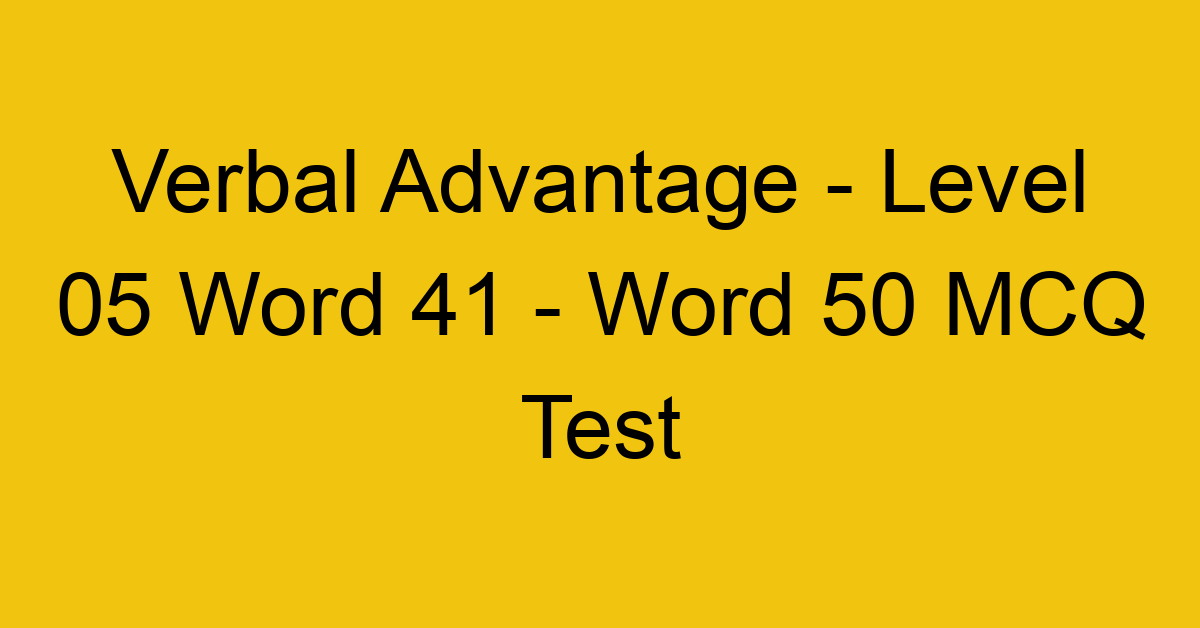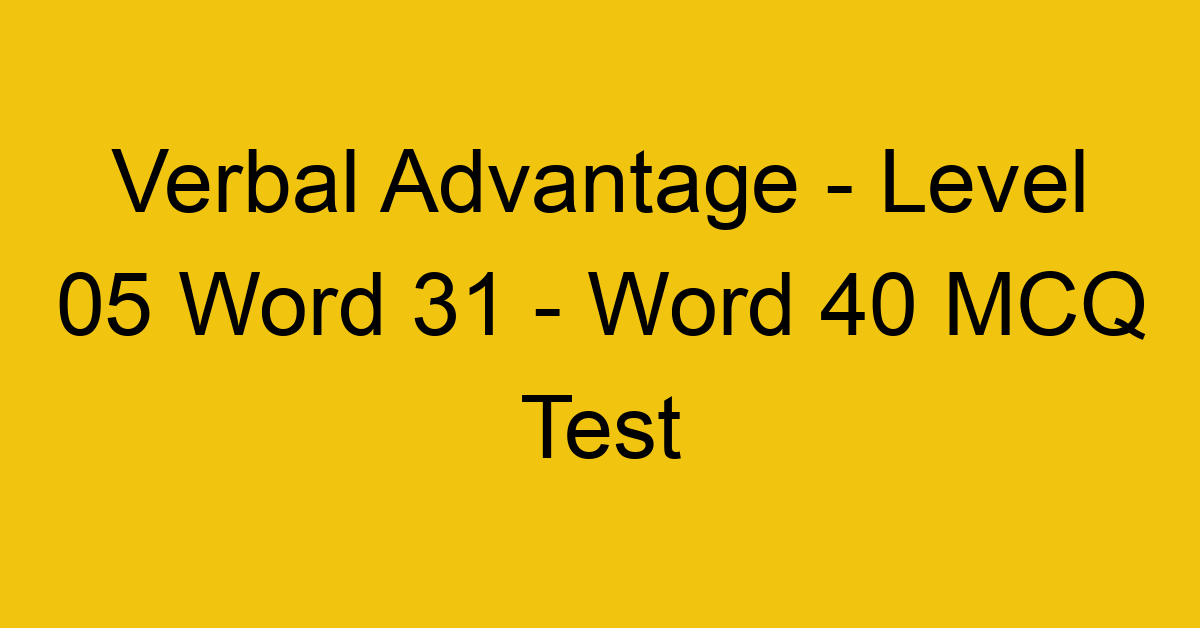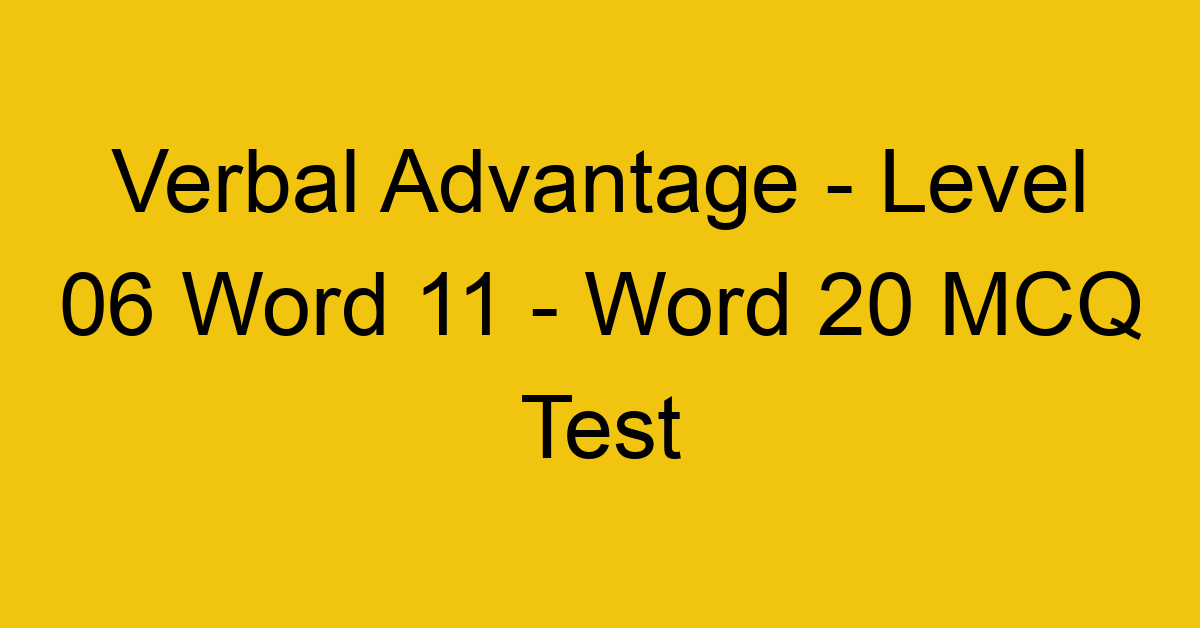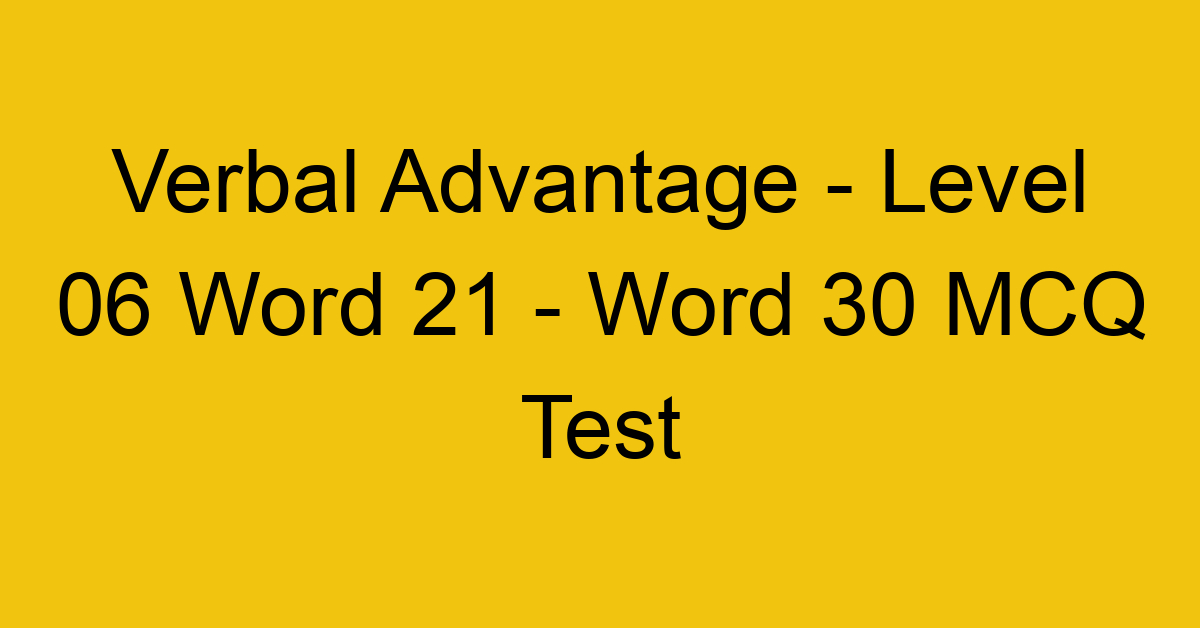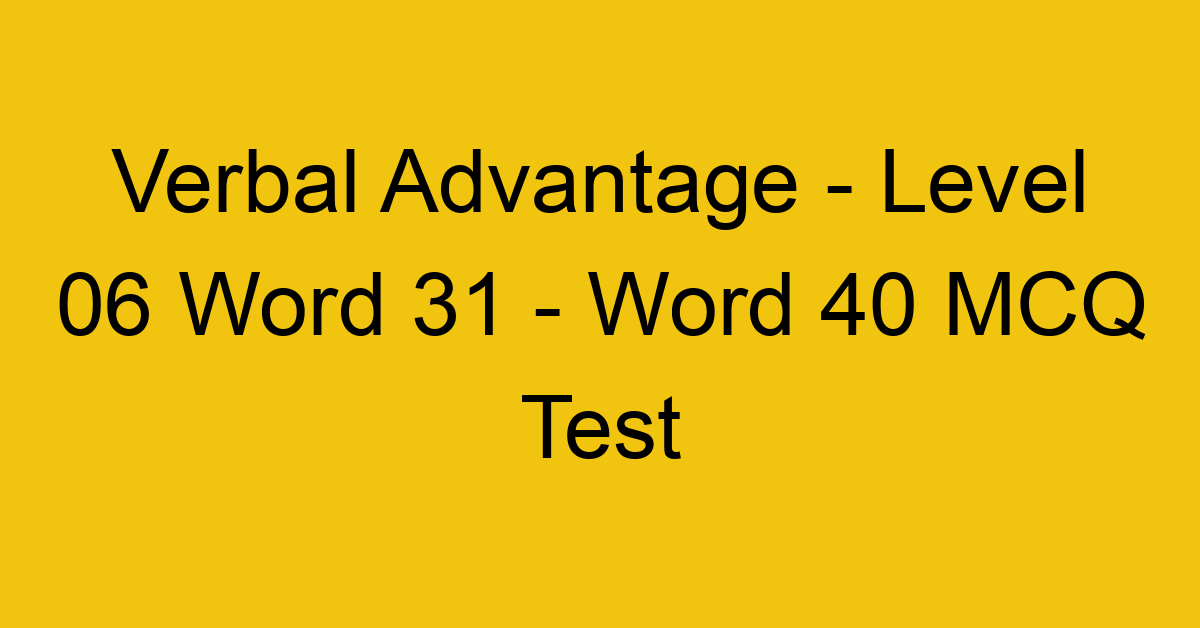Verbal Advantage - Level 06 Word 1 - Word 10 MCQ Test
Word List
- Word 1: Legerdemain [LEJ-ur-duh-MAYN]
Sleight of hand, a cleverly executed trick or deception.
→
In a general sense, the simple word magic is a synonym of legerdemain. More challenging synonyms of legerdemain include prestidigitation and thaumaturgy, which I’ll discuss (and pronounce) in a moment, after I tell you about the expression “sleight of hand.”
The word sleight (SLYT, like slight) is related to the word sly, and “sleight of hand” means literally slyness of the hand, a clever trick or illusion done with the hands.
Legerdemain, prestidigitation (PRES-ti-DIJ-i-TAY-shin), and thaumaturgy (THAW-muh-TUR-jee) all refer to magic or deception, but each word has a more specific and precise meaning. Thaumaturgy comes from the Greek word for miracle, and by derivation means the working of miracles. The presti- in prestidigitation comes ultimately from the Italian presto, meaning nimble, quick; the digit in the middle of prestidigitation is the word digit (DIJ-it), which in one of its senses means “a finger.” By derivation prestidigitation is nimbleness with the fingers, quickfingeredness. Prestidigitation is used as a general synonym for legerdemain, sleight of hand, but sometimes it refers specifically to the art of juggling.
Legerdemain comes from a Middle French phrase meaning “light of hand.” Today the word may refer specifically to adroitness with the hands, as in performing magic tricks, or to any display of clever skill and adroitness. For example, a surgeon, a musician, and an athlete all may display legerdemain. In current usage legerdemain may also denote a cleverly executed trick or deception: “Larry hired a sleazy accountant who promised he could outwit the IRS by performing financial legerdemain”; “The first lesson of politics is ‘Watch out for dirty tricks and other unscrupulous forms of legerdemain.’”
When you spell legerdemain, remember that it does not have an e at the end.
- Word 2: Puerile [PYOOR-ul or PYOO-ur-ul]
Childish, immature; hence, foolish, silly.
→
Puerile comes through the Latin puerilis, meaning youthful, childish, from puer, a child.
Synonyms of puerile in the sense of “childish or immature” include infantile and juvenile. Synonyms of puerile in the sense of “foolish or silly” include inane (i-NAYN), frivolous, asinine, fatuous (FACH-oo-us), sophomoric (SAHF-uh-MOR-ik), and callow (word 30 of Level 4).
Infantile, juvenile, and puerile all may be used in a general way to mean pertaining to childhood. Specifically, however, infantile means pertaining to infancy, to babyhood or very early childhood; puerile means pertaining to the childhood years, the time between infancy and puberty; and juvenile means pertaining to preadulthood, the teenage years.
You can see the words used in this specific way in the phrases “infantile paralysis,” “juvenile court,” and “puerile respiration,” which is a respiratory murmur heard in healthy children that in adults is considered a sign of disease.
These three words may also be used in a general sense to mean childish, immature, foolish, characteristic of youth. In this sense, juvenile is the least negative; puerile implies harsher judgment; and infantile is the strongest, suggesting the most disagreeable characteristics of childhood—extreme silliness and immaturity. For example, juvenile desires may be simply youthful desires, childlike thoughts in an older head. Puerile behavior is childish and inappropriate behavior, unbecoming of one’s years; it may refer to children who act younger than they are, and it may only be temporary. Infantile behavior, however, is extremely childish, and an infantile remark is foolish and stupid.
Puerile has two corresponding nouns: puerilism (PYOOR-ul-iz-’m or PYOO- ur-ul-iz-’m) and puerility (pyuu-RIL-i-tee or PYOO-uh-RIL-i-tee). Puerilism is a psychiatric term for the abnormal appearance of childish behavior in an adult. In my considered but medically unsubstantiated opinion, puerilism is the chief occupational disorder of writers and actors. Puerility may be used in a general sense to mean childishness, immaturity; in civil law, puerility refers to the status of a child between infancy and puberty. Between puberty and the established legal age of maturity, the child is a juvenile.
- Word 3: Complicity [kum-PLIS-i-tee]
Conspiracy, partnership in wrongdoing, criminal participation, direct association in guilt, the state of being an accomplice.
→
Conspiracy, confederacy, collusion, and complicity all refer to partnership or participation in disreputable or illegal activities.
Conspiracy means the act of plotting and cooperating secretly, especially to achieve an unlawful, evil, or treacherous purpose, as a conspiracy to commit murder.
Confederacy refers to people, groups, states, or nations united for a common purpose. It may be used neutrally to mean simply an alliance, as “OPEC is a confederacy of Middle Eastern oilexporting countries.” Quite often, however, confederacy is used in a negative sense to mean an alliance in wrongdoing, as “a confederacy of terrorists bent on overthrowing the government.”
A collusion is a specific type of conspiracy: a secret understanding in which one person or group plays into another’s hands with the aim of defrauding a third party. For example, if witnesses in a legal trial or parties to a negotiation are in collusion, they are cooperating secretly while appearing to be adversaries.
Here it seems appropriate to digress for a moment to discuss the noun connivance and the verb to connive, which today are often used interchangeably with collusion and the verb to collude. Strictly and traditionally, however, these words are not synonymous.
Connivance and connive come from the Latin connivere, to wink at, and by derivation suggest the act of winking at wrongdoing. Originally, and in my opinion properly, to connive is not to conspire or cooperate secretly in an unlawful act but to wink at it, to pretend not to see it or know about it and so give tacit consent or encouragement: “They bribed the doorman so he would connive at the burglary”; “The police department connived at organized crime in the city.”
In like manner, connivance properly means the act of conniving, feigning ignorance of wrongdoing: “Illegal gambling would not exist in this town without the connivance of the authorities”; “When investigators exposed the plot to embezzle company funds, they accused the vice president of connivance.”
I should point out here that my opinion of how connive and connivance should be used is puristic, and to a certain extent wishful thinking. All current dictionaries countenance scheme, plot, and conspire as synonyms of connive and sanction conspiracy as a synonym of collusion. My point in raising this issue is not so much to condemn a minor implosion of language as it is to make you aware of the traditional definitions of connive and connivance, which current dictionaries also countenance but which you may not have known until now. My aim is not to prevent you or anyone else from using connive to mean to plot or conspire. My simple, earnest hope is only that you will learn and remember its other, original meaning: “to feign ignorance of wrongdoing.”
And now back to our keyword, complicity. It comes from the Latin complicare, to fold up or fold together, the source also of the words complicate, which means literally “to fold or twist together,” and accomplice, which means literally “a person who is folded up” and therefore involved.
Whereas connivance suggests passive cooperation in something unlawful, complicity denotes active participation or partnership in wrongdoing, the state of being an accomplice: “When charged with conspiracy, the defendant professed his innocence and denied any complicity in the plot.”
- Word 4: Transmute [tranz-MYOOT or transMYOOT]
To transform; specifically, to change from one nature, form, or substance into another, especially to a higher, better, or more refined one.
→
The verb transmute combines the prefix trans-, meaning “across” or “beyond,” with the Latin mutare, to change. Literally, transmute means “to change across the board” or “to change something beyond what it is.”
Transmute was once used in the primitive science of alchemy (AL-kuh-mee), which preceded modern chemistry, to refer to the changing of base metals or common elements into a higher form, as to transmute iron into gold. Today the word is used generally to mean to completely change the nature or substance of something, especially to change it to a more refined or more desirable state: You can transmute an idea into a reality, transmute sorrow into joy, or make a modest investment that over thirty years transmutes into a substantial nest egg for retirement.
- Word 5: Abstruse [ab-STROOS]
Difficult to understand, hard to grasp mentally, deep, profound, incomprehensible, unfathomable.
→
Antonyms of abstruse include manifest, discernible (word 32 of Level 3), lucid (word 45 of Level 3), and perspicuous, which I’ll discuss later in this level.
Challenging synonyms of abstruse include inscrutable (word 48 of Level 3), esoteric (word 29 of Level 5), and also occult, cryptic, enigmatic, arcane, recondite, and acroamatic.
Let’s take a closer look at some of those rather abstruse synonyms, all of which apply to things that are secret and mysterious or difficult to understand.
By derivation esoteric (ES-uh-TER-ik) means understood by a select group, intended only for the knowledge of a few; hence, secret, confidential, or beyond most people’s knowledge or understanding.
Occult (uh-KUHLT, first syllable like a in ago) by derivation means hidden or concealed. Today occult may be used either of that which is secret because it is hidden from view or of that which is secret because it is mysterious or incomprehensible.
Cryptic (KRIP-tik) comes from the Greek kryptos, hidden, which comes in turn from the verb kryptein, to hide. The familiar word crypt comes from the same source and means a burial chamber hidden underground. In modern usage cryptic applies to that which has a hidden meaning: cryptic ideas are mystifying ideas; a cryptic message is an incomprehensible or coded message.
The noun enigma (i-NIG-muh) and the adjective enigmatic (ENig-MAT-ik) come from a Greek verb meaning “to speak in riddles.” An enigma is something or someone like a riddle, a mystery, puzzle. Enigmatic means like an enigma, and therefore perplexing, puzzling, ambiguous, or incomprehensible. Enigmatic is perhaps most often used of something written or stated, but the word may also apply to actions and to people.
Arcane (ahr-KAYN) comes from the Latin arcana, meaning “shut, closed,” or “secret,” and ultimately from arca, a box or chest, especially a money chest. By derivation arcane means shut or closed up, and, like esoteric, arcane is now used of that which is known only to a few people. The word usually applies to knowledge or information, as an arcane theory.
Recondite (REK-un-dyt) comes from the Latin recondere, to put away, conceal. In modern usage recondite applies to that which is beyond the grasp of the ordinary person. To most people, for example, particle physics is a recondite subject.
Acroamatic (AK-roh-uh-MAT-ik) is an abstruse and unusual synonym of esoteric—so unusual that you won’t find it listed in most dictionaries. Historically, acroamatic applies to certain writings by the ancient Greek philosopher Aristotle (AR-iSTAHT-’l) that were addressed to his disciples as opposed to his exoteric (EKS-uh-TER-ik) writings, which were intended for a popular audience. Acroamatic comes from the Greek akroamatikos, which means “designed for hearing only.” According to the encyclopedic Century Dictionary (1914), Artistotle’s acroamatic writings “were addressed to ‘hearers,’ that is, were intended to be read to his disciples or were notes written down after his lectures.” In a general sense, acroamatic may refer to that which is esoteric, intended for and understood by a select group, recondite, beyond the grasp of the average person, and abstruse, extremely hard to understand.
By derivation abstruse means put or pushed away, and today the word connotes that which has been pushed out of the realm of comprehension. Scholars and scientists are fond of using abstruse academic jargon to discuss abstruse subjects and ideas. If you buy a computer, the user’s manual probably will be so abstruse that you’ll wind up having to call the customer service hotline for help.
- Word 6: Edify [ED-i-fy]
To instruct, improve, teach, enlighten; especially, to instruct or improve intellectually, morally, or spiritually.
→
Anything that improves the mind, the character, or the spirit can be described as edifying. If you find an experience instructive, eye-opening, or uplifting, you can say that it edified you or that you found it edifying. You can be edified by a movie, a play, a book, a conversation, by traveling, or by working on an interesting project. As I noted in the first half of the program, if you want to learn more about the world and learn more words, then reading is the best way to edify yourself. But even entertainment can be edifying, although some forms of entertainment, such as watching reruns of “Wheel of Fortune,” probably won’t edify you at all.
The corresponding noun is edification, which means enlightenment—intellectual, moral, or spiritual improvement: “Public libraries exist for the benefit and edification of all people”; “He was a philanthropist devoted not only to the material betterment of less fortunate members of society but also to their edification.”
Except when used humorously, the phrase “for your edification” should probably be avoided. It has become a cliché, and often has a condescending overtone.
- Word 7: Supercilious [SOO-pur-SIL-ee-us]
Haughty, proud, scornful, contemptuous, disdainful.
→
Supercilious comes from the Latin super-, meaning “over, above,” and cilium, eyebrow; by derivation it means with raised eyebrows, and therefore proud, haughty, disdainful. Supercilious suggests the proud, contemptuous attitude or expression of someone who thinks he’s superior and who looks down at others with scorn: “Lucy’s new supervisor had seemed quite amiable in her interview, but to her dismay she soon found out he had a supercilious way of assigning her a project and then telling her, ‘If I were you, I’d do it like this.’”
- Word 8: Dissemble [di-SEM-buul]
To disguise; conceal under a false appearance; speak or behave hypocritically; cover up the facts or one’s true feelings or motives; mask under a pretense or deceptive manner.
→
Synonyms of dissemble include to feign, affect, simulate, camouflage, equivocate (i-KWIV-uh-kayt), and prevaricate (pri-VARi-kayt).
To disguise is the general word meaning to give something a false appearance so it won’t be recognized. We disguise our physical appearance, disguise facts, or disguise intentions.
To feign (rhymes with rain) means to represent falsely, pretend that something exists or is real, as to feign interest, feign illness, feign innocence, or feign sleep.
To affect (uh-FEKT) means to put on a false appearance to make a certain impression, as to affect knowledge, affect a cultivated pronunciation, affect social superiority, or affect a carefree manner when your heart is breaking.
Our keyword, dissemble, comes from an Old French verb meaning “to appear different,” and by derivation means to make something appear different from what it is. When you dissemble the facts or dissemble your feelings, you conceal them under a false appearance. The person who dissembles speaks or behaves hypocritically so as to cover up the truth.
- Word 9: Vacuous [VAK-yoo-us]
Empty, vacant; devoid of substance, interest, intelligence, expression, or meaning.
→
Synonyms of vacuous include blank, unintelligent, shallow, stupid, senseless, inane, and fatuous. The corresponding noun is vacuity (va-KYOO-i-tee), emptiness, an absence of matter or intellectual content.
Vacuous comes from the Latin vacuus, empty. In modern usage vacuous is not used where empty or vacant would be appropriate. An empty box or a vacant apartment cannot be described as vacuous. Vacuous usually applies to a figurative lack of content, meaning, or interest. We speak of vacuous eyes, a vacuous discussion, a vacuous mind, a vacuous remark, or a vacuous proposal.
- Word 10: Capacious [kuh-PAY-shus]
Roomy, spacious, ample, able to contain or hold a great deal.
→
Capacious may be used either literally or figuratively. When used literally it is a synonym of spacious and roomy: a capacious house; their capacious office; an overcoat with capacious pockets. When used figuratively, it is a synonym of broad and comprehensive: a capacious intellect; a capacious embrace; a capacious view; a capacious treatment of a subject.


